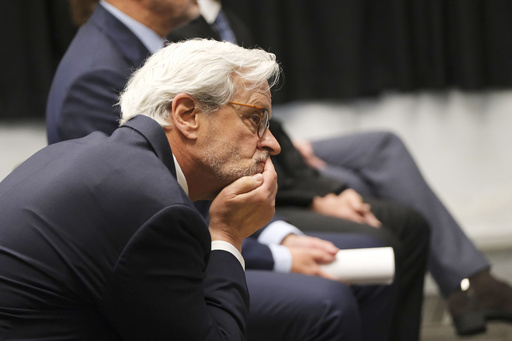Oklahoma City has been the backdrop for numerous legal battles surrounding the controversial case of Richard Glossip, a death row inmate who has had nine execution dates set against him. Despite enduring three last meals and even remarrying during his time in prison, Glossip has remained alive. His legal journey has included a Supreme Court rejection of his challenge to Oklahoma’s lethal injection method, which took place nine years ago.
In an unexpected development, the state’s Republican attorney general has allied with Glossip in a push to overturn his murder conviction related to a 1997 murder-for-hire plot. This surprising collaboration has revitalized Glossip’s case, placing it back before the Supreme Court for fresh arguments scheduled for Wednesday. The ongoing judicial proceedings arise as the use of the death penalty has generally dwindled, accompanied by a reduction in new death sentences. That said, the current conservative majority on the court shows little tendency to pause executions.
It is quite uncommon for prosecutors to acknowledge significant errors made that resulted in the issuance of a death sentence. However, Oklahoma Attorney General Gentner Drummond has called for a new trial for Glossip, recognizing shortcomings in the original case. Similar initiatives have emerged in other states, as prosecutors in Alabama and Texas have sought newer trials or at least the reprieve of certain death row inmates.
Robin Maher, executive director of the Death Penalty Information Center, noted that recent cases signal to the public that the current death penalty system is unreliable in achieving fair and just outcomes. Glossip has consistently maintained his innocence regarding the 1997 murder of motel owner Barry Van Treese. Prosecutors have aimed to make it clear that the crime involved a hired killer, with another individual, Justin Sneed, confessing to the crime while claiming Glossip offered him $10,000 to carry it out. Sneed, in exchange for his testimony, received a life sentence and has served as the pivotal witness against Glossip.
While Drummond does not assert Glossip’s innocence, he argues that the trial was marred by unfair practices. Specific concerns raised by the attorney general include the knowledge that Sneed fabricated parts of his testimony regarding his mental health status and the erasure of critical evidence, such as motel receipts and other items, that might have supported Glossip’s claims of innocence.
According to Don Knight, Glossip’s attorney with extensive experience in capital cases, the attorney general’s statements highlight unprecedented acknowledgment regarding a lack of fairness in a death penalty trial. Despite these revelations, an Oklahoma appeals court has upheld Glossip’s conviction, and efforts for clemency have faltered in a tie vote from the state’s pardon and parole board.
At the Supreme Court, Glossip is aided by a team of prominent attorneys, including former solicitors general who are advocating for a retrial. In response, a court-appointed attorney will support the state court’s original judgment, arguing that Glossip should face execution. Several states have also expressed their stance, advocating for the upholding of Glossip’s conviction to ensure that federal courts respect state court decisions.
Supporters of Glossip’s plea for a new trial include nearly two dozen current and former state and federal prosecutors. They express concern over perceived misconduct involving law enforcement in the case, particularly regarding the alleged coaching of Sneed to implicate Glossip.
The lengthy saga of Glossip’s trial exemplifies the intricate legal complexities associated with death penalty cases. Back in 2015, he was in a cell close to the state’s execution chamber, waiting for what was supposed to be his final moments. However, an execution was abruptly postponed due to a protocol error regarding lethal drugs, leading to a nearly seven-year halt on executions in the state.
The Van Treese family, the murdered victim’s relatives, have also faced challenges throughout this protracted legal ordeal. Their attorney has reiterated the family’s desire for justice, lamenting that they have been kept in suspense for over 10,000 days due to recent developments suggesting errors in the case that they believe do not exist.
Former Oklahoma County District Attorney David Prater, who has scrutinized Glossip’s case multiple times, remains convinced of his guilt. Despite previous prosecutors being those who initially handled the case, Prater has pushed for clemency to be denied owing to a lack of evidence that might undermine the conviction’s integrity.
A ruling from the Supreme Court is anticipated by early summer, as this complex and contentious case continues to unfold.


